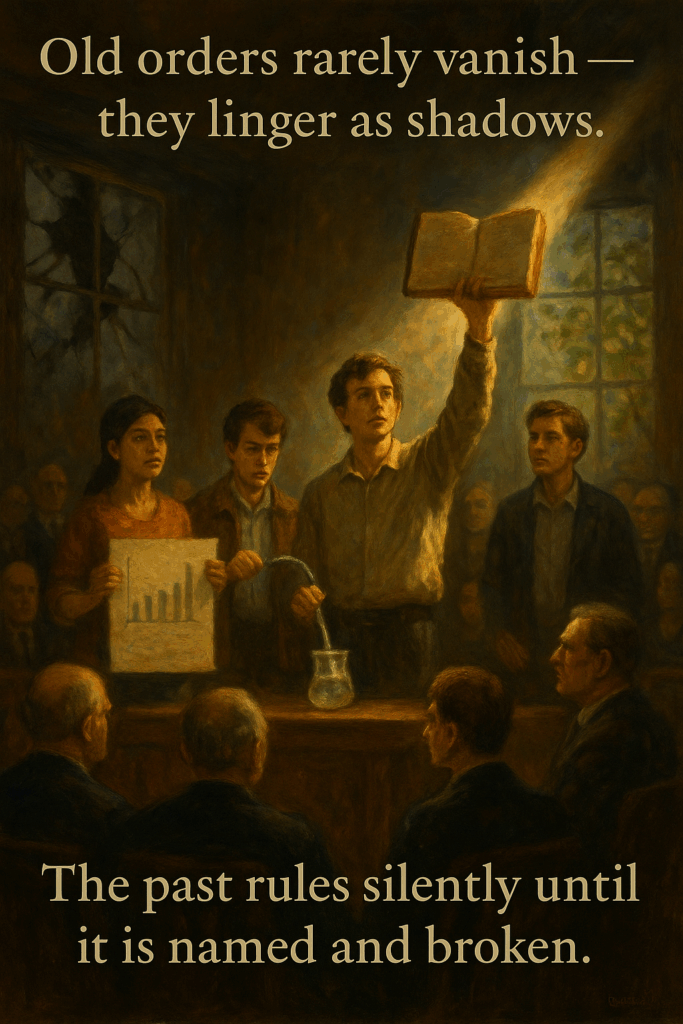
The greenhouse stood resilient under the late May sun, its glass panes gleaming with the labor of care—repaired cracks catching the light like scars turned into stories. Inside, the air hummed with the quiet rhythm of growth: vines climbing their stakes, sensors blinking steadily, and the ledger lying open on its wooden table like scripture.
But beyond the glass walls, shadows lengthened—not of clouds, but of doubts. The school board, pressed by city-wide budget cuts, announced a review of extracurricular programs. The greenhouse—once dismissed as a relic, now a fragile symbol of the Accord—was at risk.
Parents gathered at the gates, their voices sharp with worry. “We need structure, not experiments.” Teachers, weary from years of upheaval, nodded. “Governance belongs to adults. Students should focus on studies.” The old order was speaking again, alive in the tones of nostalgia and control.
In the library, the Forum convened beneath its patched windows. Elias paced, agitation sparking in his every word.
“If we don’t act fast, they’ll dismantle everything. We need results, and we need them now.”
Sam shook his head, conviction bracing his voice.
“Results mean nothing if we abandon our principles. The Accord isn’t just a greenhouse. It’s us. If we cave to pressure, we’re no better than what we replaced.”
The room divided once more—efficiency against inclusion, haste against patience. Emil sat silent, the ledger before him heavy with its small victories: Basil plant gifted, not taken. Irrigation fixed without blame. But against the threat of erasure, these entries felt frail.
Then, from the back, a shadow stirred. Marco leaned lazily against a bookshelf, his voice smooth as oil.
“They’re right, you know. Budgets don’t care about your basil plants. Power does. And power lies with those who decide, not those who debate.”
His words, whispered into corners, became sparks on dry tinder. “The Accord is a child’s game.” “The adults will end this farce.” Marco didn’t need to seize power. He only needed to corrode trust—control disguised as wisdom, vengeance in cynicism, dehumanization in dismissal, distortion in doubt.
But then Lara stood. Her voice, once sharp with rivalry, now carried a calm strength earned through tending soil and people alike.
“I lost something once,” she said quietly. “A community theater project. We fought hard, but the city cut it because we couldn’t show its worth—numbers, impact, proof. I learned then: you don’t fight shadows with anger. You fight them with light.”
Her words steadied the room. Emil felt something stir, his grandfather’s voice echoing in memory: “The old order casts long shadows, but light grows from what we choose to show.”
He rose.
“Lara’s right. We don’t need to argue. We need to show them. Not just plants, but a community. Let’s open the greenhouse. Invite everyone—parents, teachers, the board. Let them see the ledger’s truth, the sensors’ data, the art and robotics joined together. Let them see what we’ve built.”
Hope flickered. Priya suggested compiling a visual report: charts of water savings, photos of growth, voices of students who found purpose here. Mateo offered to demonstrate the irrigation system, whirring proof of collaboration. Elias and Sam, though opposed moments before, agreed to co-lead the presentation—grafting speed and inclusion into strength.
The following week, the auditorium filled. The board sat sternly in front; parents crowded the aisles. Photos of broken panes and blooming vines lined the walls. Students spoke in turn, their voices carrying stories of mended trust and shared victories. Lara’s vulnerability bridged suspicion. Elias and Sam’s joint words modeled compromise.
When doubt rose—“What about cost?”—Priya showed the numbers. When cynicism sneered—“Students can’t govern.”—Mateo’s model irrigation line gurgled with undeniable precision. Emil held the ledger before them all:
“This isn’t just a greenhouse. It’s proof we can build something better—not by fighting, but by tending. Not by silencing, but by listening.”
The vote was close. But the greenhouse was spared. Funds were allocated. The Accord endured.
That evening, in the quiet of the greenhouse, Priya wrote into the ledger with deliberate hand:
May 22 — The Shadow of the Old Order
- The Symptom: Parents and teachers demand hierarchy and predictability.
- The Disease: The Four Absences.
- Absence 1 (Forgetting the Test): Adults cling to the “harbor” of top-down order, mistaking structure as permanence rather than recognizing governance itself must remain a living test.
- Absence 2 (Vengeance): Calls to dismantle the greenhouse in punishment for its “unorthodoxy,” rather than assessing its value fairly.
- Absence 3 (Dehumanization): Students reduced to “children playing government,” their efforts dismissed as illegitimate.
- Absence 4 (Unheard Cry): Parents’ and teachers’ real anxieties (about instability, about accountability) left unspoken, emerging instead as rejection.
- Investigator’s Response: Illuminate results through the ledger and data. Show not permanence but proof of care, cooperation, and growth.
Outcome: Accord preserved. Funding secured. The shadow lingers, but roots hold.
Emil touched the vines brushing his hands and thought of his grandfather’s voice: “Light grows from what we choose to show.” The shadow might return. But now they had learned the investigator’s craft—naming the disease, tracing the absences, and showing the living cure.

